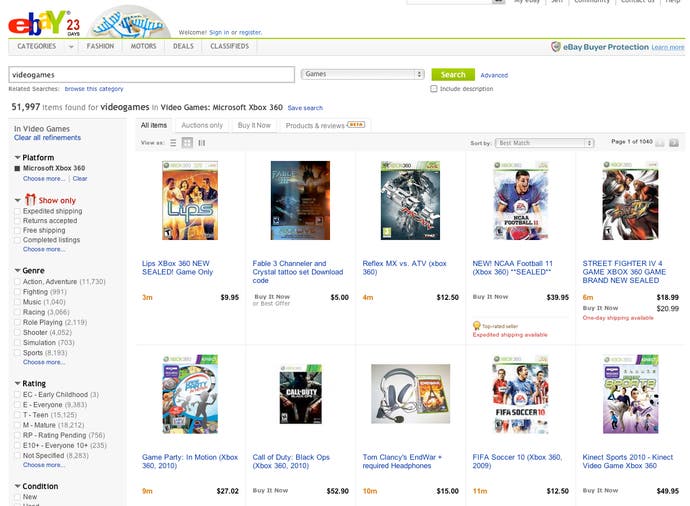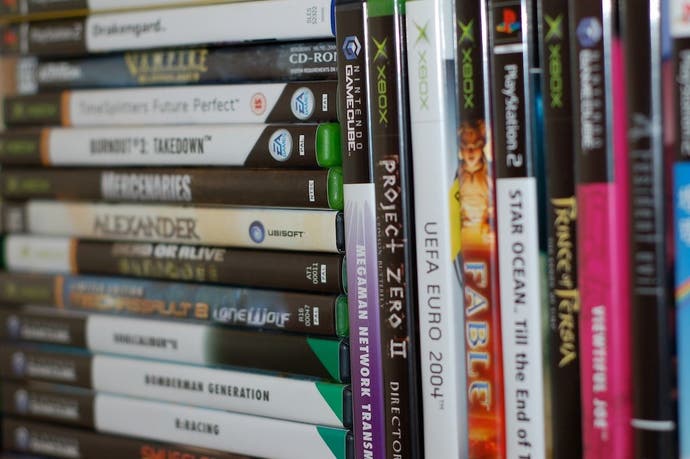Are pre-owned sales killing gaming?
A look at both sides of the argument.
That battle was lost a little less than a decade ago, when the Japanese courts finally ended a lengthy series of claims and appeals which had flown between retailers and publishers. The verdict? Selling second-hand software is legal, and games publishers just have to live with it.
Today Japan's shopping districts are overflowing with second-hand goods - glorious for the savvy gamer, but the cause of some serious teeth-gritting amongst industry executives.
Any attempts at changing the law outside Japan are equally unlikely to succeed. Second-hand sale is protected in the US by something called First Sale Doctrine, and elsewhere by a grab-bag of similar consumer rights.
Regardless of where you, are the principle is the same - if you paid good money for it you own it, and you can sell it. Even legal systems prepared to make exceptions for vastly expensive corporate software packages are unlikely to give the same leeway to game publishers trying to stiff individual consumers out of a few quid.
Where the stick failed, the games industry is trying the carrot. The past 12 months have seen a host of new initiatives designed to take the wind out of the sales of the second-hand market.
At their best - like the better executed versions of EA's Project Ten Dollar - they add extra value to a brand new purchase, by including a code that gives you access to future DLC for free. At their worst, they strip regular features out of games unless you have a code from an original copy.

Have these incentives worked? The answer is a resounding maybe. There's no sign of second-hand sales abating - if anything they're surging, with more retailers starting to include trade-ins as part of their business model.
But comments from publishers who have experimented with such systems have mostly been positive. At least they're making some money from consumers who previously only filled retailers' pockets. (Although you could argue that if DLC was compelling enough to be worthwhile second-hand buyers would purchase it anyway, without publishers needing to resort to cheap tactics like Project Ten Dollar.)
In the meantime the industry is pinning its hopes on a change in the business model. According to this vision of an all-digital future, we'll pay for subscriptions to games rather than buying them outright. Or we'll play them for free but make in-game purchases.
Or none of us will own anything - we'll just buy licenses for software that resides on a remote server. Or we'll all be plugged into giant computer systems which harvest our bio-electricity in return for letting us play in a simulated reality where leather trenchcoats are actually fashionable. Or something.
Is there a third way?

One path out of this trap might be to consider that the real enemy here, as far as publishers are concerned, isn't the gamer buying a second-hand title. It's the retailer who skims off enormous profits from the pre-owned market, and who actively promotes second-hand product ahead of brand new games.
It was rare to hear developer complaints about the grubby second-hand bin in the corner a few years ago. That game creators have grown more disgruntled as game retailers have become more brazen is hardly surprising.
If the middle-man is the real problem, what happens if we cut him out? Plenty of savvy gamers have realised they can make more money selling their games on eBay than by handing them to GAME in return for a paltry trade-in fee. It's more hassle but it's much more lucrative - and it's not so much the trading of games as the profit margins of the retailers that seems to enrage the industry so much. (Although there's a particular brand of executive who believes we shouldn't even be allowed to lend games to our friends. Like most raving lunatics, they're best ignored.)
We could go a step further and take money out of the equation entirely. An idea which has been attempted a couple of times is using the internet to hook up gamers who want to trade games, so they can swap titles directly.
One ongoing attempt to make this work is GaBoom.co.uk, a site founded by British entrepreneur Jess Ratcliffe - whom telly addicts may recognise from an appearance on Dragon's Den.








